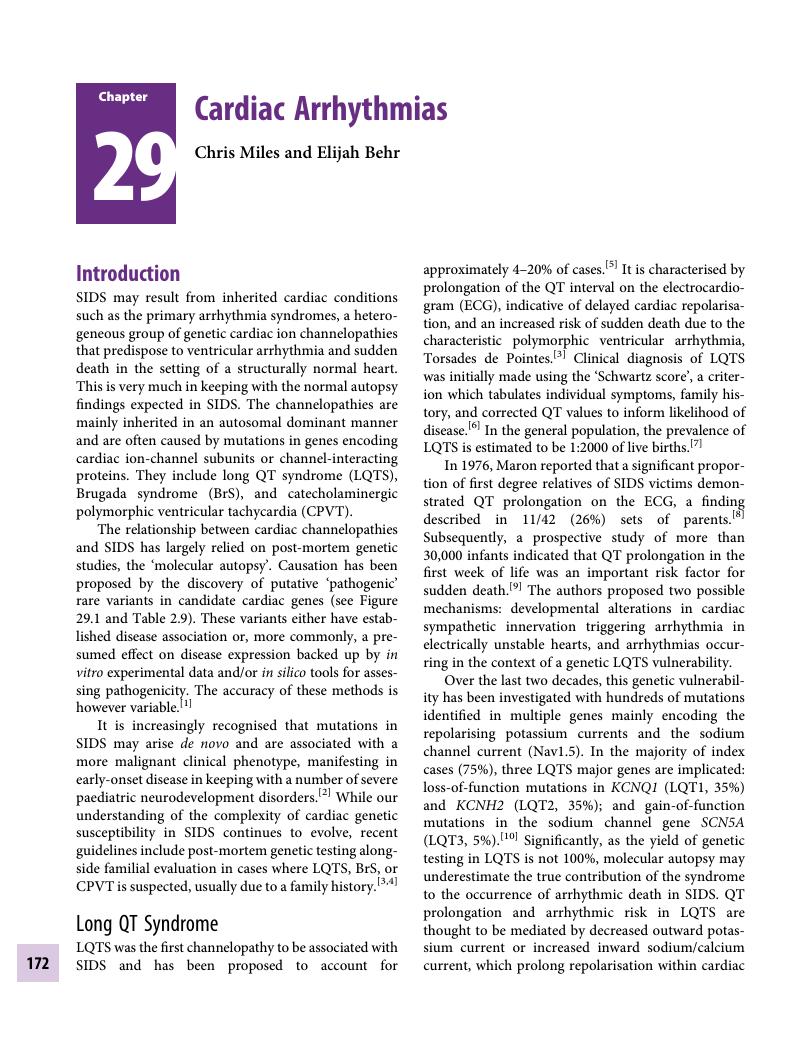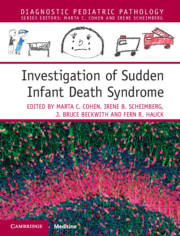Book contents
- Investigation of Sudden Infant Death Syndrome
- Diagnostic Pediatric Pathology
- Investigation of Sudden Infant Death Syndrome
- Copyright page
- Contents
- Contributors
- Foreword
- Preface
- Section 1 The History of SIDS
- Section 2 The Parents
- Section 3 Legal Framework
- Section 4 Best Practices Protocols of Investigation of Sudden Unexpected Death in Infancy and Childhood
- Section 5 Autopsy Findings
- Section 6 Epidemiology and Risk Factors
- Section 7 Pathophysiology
- Chapter 28 The Genetics of Sudden Infant Death Syndrome
- Chapter 29 Cardiac Arrhythmias
- Chapter 30 Sudden Infant Death Syndrome from the Brainstem Perspective
- Chapter 31 Arousal and Risk Factors for SIDS
- Chapter 32 Serotonin Abnormalities in the Brainstem of Sudden Infant Death Syndrome
- Chapter 33 Inner-Ear Abnormalities in SIDS
- Chapter 34 Inherited Metabolic Disease and Sudden Unexplained Death in Infancy and Childhood: Pathophysiology
- Section 8 SUDI/SUID Which is Not SIDS
- Index
- References
Chapter 29 - Cardiac Arrhythmias
from Section 7 - Pathophysiology
Published online by Cambridge University Press: 04 June 2019
- Investigation of Sudden Infant Death Syndrome
- Diagnostic Pediatric Pathology
- Investigation of Sudden Infant Death Syndrome
- Copyright page
- Contents
- Contributors
- Foreword
- Preface
- Section 1 The History of SIDS
- Section 2 The Parents
- Section 3 Legal Framework
- Section 4 Best Practices Protocols of Investigation of Sudden Unexpected Death in Infancy and Childhood
- Section 5 Autopsy Findings
- Section 6 Epidemiology and Risk Factors
- Section 7 Pathophysiology
- Chapter 28 The Genetics of Sudden Infant Death Syndrome
- Chapter 29 Cardiac Arrhythmias
- Chapter 30 Sudden Infant Death Syndrome from the Brainstem Perspective
- Chapter 31 Arousal and Risk Factors for SIDS
- Chapter 32 Serotonin Abnormalities in the Brainstem of Sudden Infant Death Syndrome
- Chapter 33 Inner-Ear Abnormalities in SIDS
- Chapter 34 Inherited Metabolic Disease and Sudden Unexplained Death in Infancy and Childhood: Pathophysiology
- Section 8 SUDI/SUID Which is Not SIDS
- Index
- References
Summary

- Type
- Chapter
- Information
- Investigation of Sudden Infant Death Syndrome , pp. 172 - 177Publisher: Cambridge University PressPrint publication year: 2019

